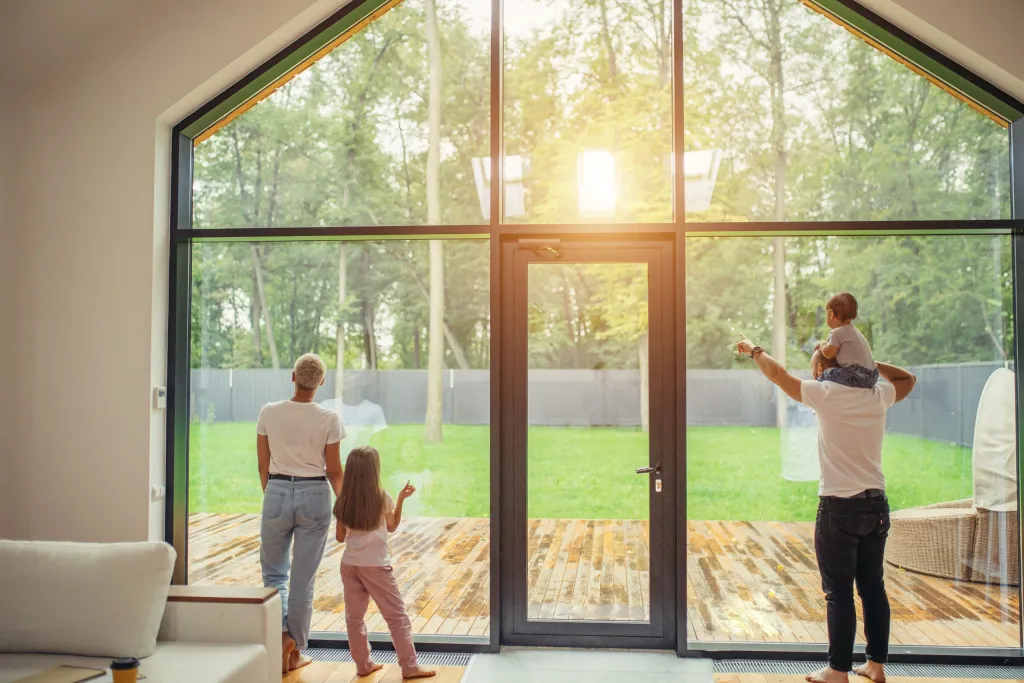The Real Pros and Cons of Home Window Tinting
Window tinting is no longer just for cars. In recent years, an increasing number of homeowners have turned to residential window tinting to improve comfort, reduce energy bills, and add a sleek, modern appearance to their homes. But while the benefits may sound compelling, home window tinting is not without its potential drawbacks. Whether you are trying to reduce glare, block harmful UV rays, or enhance privacy, it is important to consider both the advantages and disadvantages before applying tint to your windows.

Home Window Tinting
The Benefits of Home Window Tinting
One of the most talked-about benefits of window tinting is its ability to increase energy efficiency. Tinted windows can help reduce the amount of heat that enters a home by reflecting sunlight and insulating the glass. This can lead to a noticeable drop in indoor temperatures during the summer months, allowing homeowners to reduce reliance on air conditioning and, in turn, lower their utility bills. The energy savings may not be dramatic in cooler climates, but in sunnier regions, they can be significant over time.
Another notable advantage of window tinting is improved UV protection. Modern window films are designed to block up to 99 percent of harmful ultraviolet rays. This not only helps protect residents from long-term exposure to skin-damaging radiation but also preserves the condition of furniture, carpets, and artwork. Fading caused by sun exposure can dramatically shorten the life of interior furnishings, so reducing UV penetration is a smart preventative measure for any homeowner.
Privacy is another key reason people choose to tint their windows. Depending on the film used, window tinting can make it much harder for outsiders to see into your home while still allowing natural light to enter. This can be particularly appealing for those living on busy streets or in close proximity to neighbors. Reflective films, in particular, provide daytime privacy while maintaining outward visibility.
Additionally, window tinting can improve security. Some films are designed to hold glass together in the event of breakage. This makes it more difficult for intruders to gain quick access through a window and can also reduce the danger of flying glass during storms or accidents. While it is not a replacement for a security system, it can be a useful component of a broader home protection strategy.
Potential Drawbacks of Tinted Windows
Despite these advantages, window tinting is not without its downsides. One common issue is the potential for reduced indoor brightness. Depending on the tint level and type of film chosen, some homeowners find that rooms can become too dark, especially in homes with limited natural light to begin with. This is a particular concern in colder climates or during the winter months when daylight is already scarce.
Another potential downside is the risk of choosing the wrong type of film. There are many varieties of tint on the market, from decorative films to high-performance solar films. Selecting the wrong film for your specific needs can lead to disappointment or ineffective results. Some cheaper films may bubble, peel, or discolor over time, especially when exposed to high levels of sun and moisture. For best results, it is advisable to work with a professional installer who understands your environment and requirements.
In addition to product concerns, window tinting can also affect your view. Certain films, particularly those with high reflectivity or heavy tinting, can create visual distortions or reduce visibility from the inside looking out. While this may be a worthwhile tradeoff for increased privacy or solar control, it is a consideration that should not be overlooked.
Legal and warranty issues can also come into play. Some local councils and homeowner associations have restrictions on how windows can appear from the exterior. Using reflective or dark tints may not be permitted in certain neighborhoods. Moreover, some window manufacturers void their warranty if aftermarket tint is applied, particularly if the film causes the glass to overheat or crack. Always check your window warranty and consult local regulations before proceeding.
Maintenance and Longevity
Properly installed and high-quality window tinting can last for many years, often a decade or more. However, this longevity comes with maintenance needs. Tinted windows must be cleaned using non-abrasive materials and ammonia-free cleaners to avoid damaging the film. Scratches or tears in the film are not easily repairable, meaning the entire sheet may need replacement in the event of damage.
Some homeowners are surprised to find that, while installation is generally quick, removal is not always so simple. If you change your mind in the future or need to replace damaged tint, removal can be time-consuming and potentially expensive, especially if the adhesive has hardened or the film has degraded over time.
Final Thoughts: Is Window Tinting Right for You?
Home window tinting offers a unique combination of functional and aesthetic benefits. From improved energy efficiency and UV protection to enhanced privacy and security, it is a versatile solution with a lot of appeal. However, like any home improvement decision, it comes with trade-offs. Reduced brightness, visual distortion, and potential maintenance headaches are all valid concerns that should be weighed carefully.
Before committing to tinting your windows, take time to assess your specific goals and environment. Is your home in a hot, sunny area where heat control is essential? Do you value natural light above all else? Are local regulations likely to restrict your options? By answering these questions and working with a trusted installer, you can make an informed choice that suits your lifestyle and long-term plans.
Ultimately, whether window tinting is a smart investment or an unnecessary complication depends on your individual needs. With the right product and installation, it can be a game-changer for comfort, style, and efficiency. But like any improvement, it pays to look at the view from every angle.













Great post! Glazing is such an important aspect of both aesthetics and energy efficiency in modern buildings. It’s amazing how the right glass choices can completely transform a space while also improving insulation and reducing noise. Thanks for sharing!